For larger TV distribution systems, a
switch to optical fiber can mean almost limitless outlets over vast distances
When we last looked at optical fiber
distribution system (April 2010) we found two problems, the cost, and that
Global’s Fiber MDU system is for satellite only. The optical signal is produced
by a special LNB, with no provision for terrestrial signals (TV, FM and DAB) to
be included in a true integrated reception system (IRS).
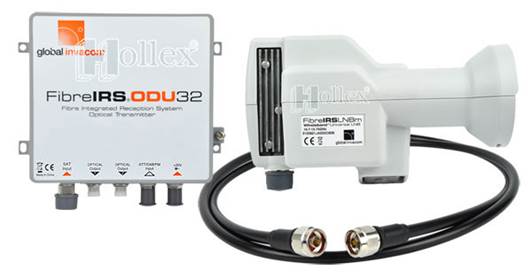
Global
Invacom ODU32 Kit
Now Global has introduced the $525 ODU32
Kit, which uses an electrical LNB, and converts both satellite and terrestrial
signals to optical in a separate unit so the combined signal is distributed by
fiber as a true IRS.
Fiber benefits
Optical fiber systems carry the signal as
light pulses squirt down a single strand of glass, which can follow the fiber
around corners. The optical fiber used in this system is only about 9um in
diameter, inside a multi-layered cable, and the pulses are provided by a 1310nm
semiconductor laser.
This enables the fiber cable to carry a
huge amount of information at very high speed. Whereas coax is limited to just
one 1000MHz satellite sub-band, fiber cable can easily carry the 5500MHz
bandwidth of the complete satellite spectrum (the four horizontal and vertical,
high and low, sub-bands stacked on top of one another) and the terrestrial
signals.
The combined signal can be freely divided
(like a terrestrial aerial signal), so you can run one cable around (almost) as
many points as you want.
Fiber cable is also thinner and more
flexible than coax and, reinforced with steel winding and Kevlar strands, it’s
a lot tougher so physically running the cable is easy. Connections are made
with FC-PC screw-on connectors, like mini F-connectors, and cable ‘ends’ must
be thoroughly cleaned before the connection is made Global supplies cleaning
kits for this.
Fiber cable introduces practically no
losses to the optical signal and suffers from no interference whatsoever along
the way, so you can use a cable even thousands of meters long without
amplification.
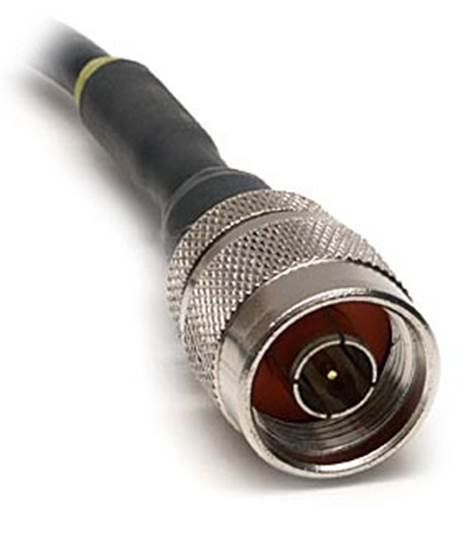
The
very high bandwidth signal from the Whole band LNB needs a special cable and
N-type connector to connect to the ODU32
Build and connections
The ODU32 Kit comprises an LNB, the outdoor
unit, and a connecting cable. The LNB is (almost) a normal LNB; it produces an
electrical signal but instead of selecting which of the four sub-bands, to
output, according to the 13/18V and 0/22KHz signals from the receiver, it
outputs all four, stacked in a 950-5500MHz IF.
That’s far too much for conventional coax
so this ‘Whole band’ LNB is fitted with a (huge) N-type connector and the kit
comes with 2m of thick special coax fitted with N-plugs at each end to connect
the LNB to the ODU32 box.
This is a 15cm square metal case supplied
with a mounting bracket for the wall near the dish or the dish pole. The ODU32
has five connectors – the N-type for the Whole band LNB, an F-connector for the
terrestrial input (from a TV aerial or the output of a cable-powered TV/FM/DAB
combiner), two optical outputs, and a standard F-connector for power (the ODU32
supplies power to the LNB via the N-type cable).
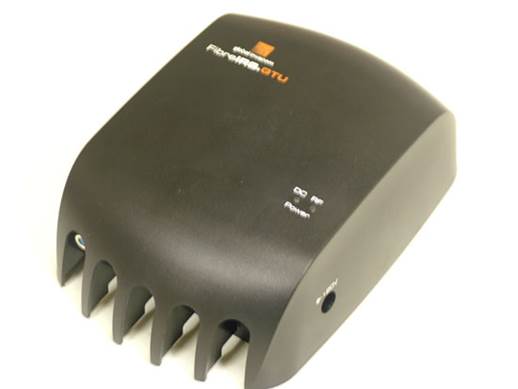
The
‘Gateway Termination Unit’ converts the optical and to a connected receiver
behaves like a normal LNB
The 20V power supply located inside with
coax to the ODU32. If you’re converting from coax to fiber, you can use the old
signal coax cable to carry this.
All the electrical connectors are
waterproofed in the normal way and the kit includes two gel-filled, clip-on
boots for the optical connectors.
Fiber distribution
It is from these optical outputs that the
rest of the system is fed. Each can supply up to 32 outlets. They are connected
using Global’s ready-made cables (it’s not practical to make your own) from
1-500m long, and optical splitter units available in 2-32-way versions (from
$37.5).
The network can be built-in a tree or a
star format to suit the number of outlets and the possible cable runs, and the
possible cable runs, and the whole thing is passive with no power to worry
about just connect it up and go.
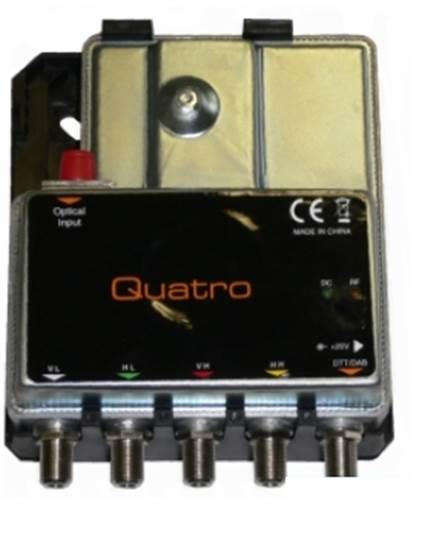
Inside
the GTU the optical input connector, and the four LNB-F-type outputs to connect
to the receivers with coax cables
Each optical outlet can feed up to 32
‘Gateway Termination Unit’ (GTU) outlets satellite and terrestrial connections.
Each GTU provides four satellite/terrestrial outputs to feed receivers directly
or through standard multiplex wall plates. There are also quarto GTUs with
separate satellite sub-bands and terrestrial outputs to feed a conventional
multi-switch, and a terrestrial-only GTU for commercial installations.
The GTUs mount on the wall (the optical
input and extra fiber cable is hidden inside the clip-on cover) near the
receivers/switch, and they’re powered by any receiver/ switch connected. It’s
neat, compact, and well thought out.
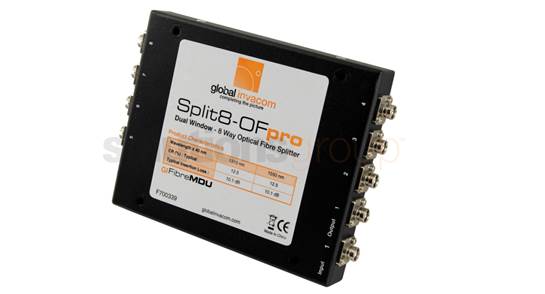
Passive
optical splitters (eight-way model shown) are used to divide the optical signal
from the ODU32 to feed the different GTUs
Performance
Not only are the components easy to install
and transparent in use, but the Fiber IRS does the job brilliantly. With the
right dish, properly aligned, the system delivers a stonking signal to (almost)
countless receivers.
It really doesn’t matter how far the wall
plates are from the dish; you’ll get the full signal, and if you want to expand
the system later, just tap off from the optical network with existing or
additional splitters; you’ll never run out of signal!
We tried it with fiber cables from 1.5m to
50m with no discernable effect on the measured output level or the picture
quality.
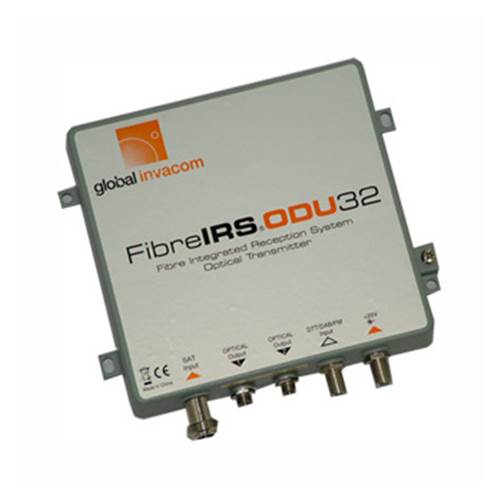
Components
for the Global Fiber MDU system are still made and the old outlet converters
are compatible with Fiber IRS systems
Verdict
There’s no denying that Fiber IRS is still
expensive, and for a domestic system of handful of outputs it won’t win
financially over a multi-switch. However, the more outlets, the cheaper it
becomes, and distance really is no object.
What’s more, Fiber IRS provides an
exceptionally easy way to distribute both satellite and terrestrial signals. If
you can make it pay, Fiber IRS is a no-brainer.
Features
§ LNB
input: 10.70-12.75GHz horizontal and vertical polarization
§ LNB
output: 950-3000MHz (vertical polarization), 3400-5450MHz (horizontal
polarization)
§ LNB
noise: 1.1dB max
§ LNB
fitting: 40mm neck
§ ODU32
input/output: 88-108MHz (FM), 174-240MHz (DAB), 470-862MHz (DTT), 950
-54500MHz (satellite)
§ Optical
output: 1310nm FM laser carrier
§ System
power: 12V-20V <500mA
§ Fiber
cable size: 2.95mm
§ Fiber
cable loss: 0.3dB/km
§ GTU
outlet converters: Quad, Quatro, DTT
Ratings
Plus
§ Limitless
reach (up to 10km)
§ Zero
interference
§ Simple
to design
Minus
§ Too
expensive for simple systems
§ Need
special meter to align the dish
§ Not
simply compatible with DiSEqC antennas
§ Build:
9/10
§ Setup:
8/10
§ Ease
of use: 10/10
§ Performance:
9/10
§ Features:
8/10
§ Value:
7/10
§ Overall:
8.5/10
|